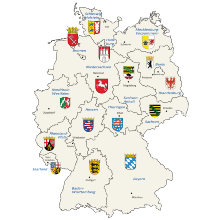History is not Bunk. Tradition, Political Economy and Regional Identity in the German Länder (in: German Politics)
The question of regional identity in the German Länder has received only little attention so far. It is of great political importance, however, as a collective identity at the regional level is a favourable condition for binding decisions to be made on that level or for the delegation of competencies from the central to regional governments. Based on data from the German General Social Survey (ALLBUS) 2016 we show that the vast majority of Germans identify with their respective Land. If the Länder have a longer historical tradition and are donors in the interstate fiscal equalisation system, this regional identity is even stronger. We also found the compatibility of national and regional identity to be somewhat lower in Länder with a long historical tradition. Our analyses indicate that even in a seemingly rather homogeneous federal state such as Germany, differences in the historical traditions of individual regions affect regional identity – in the international literature this argument has so far been used exclusively with reference to historic nations, such as Catalonia and Scotland.
Belonging and exclusion: The dark side of regional identity in Germany (in: Comparative European Politics)
A collective regional identity is a favourable condition for the acceptance of majority decisions made at the regional level and for the delegation of competencies from the central to regional governments. Moreover, a regional identity can play an important role in times of global challenges. Regional attachment might generate a we-feeling and help individuals to cope better with a complex world. The same feeling, however, might also serve as a basis for exclusionary attitudes. In this article, we analyse regional identity at the Land level in Germany with data from the German General Social Survey. Our results show that regional identity is strong in both the eastern and western parts of the country, with people in the east, surprisingly, identifying with their respective Land slightly more than people in the west, even though the five eastern Länder were only established in 1990 after decades of centralist rule. Furthermore, the dark side of regional identity manifests itself only in eastern Germany, where a stronger regional identity tends to go hand in hand with a greater dislike of foreigners.
History is not Bunk. Tradition, Political Economy and Regional Identity in the German Länder

Eva-Maria Trüdinger
PD Dr.Akademische Mitarbeiterin


